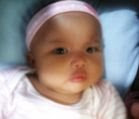 MASTERED SKILLS - most babies can:
MASTERED SKILLS - most babies can:• Stand alone for a couple of seconds
• Cruise around the furniture
• Pick up an object with thumb and forefinger.
EMERGENCY SKILLS - may be able to:
• Walk a little if you hold his hands
• Walk pushing a trolley or sturdy toy
• Put simple shapes through a shape sorter
• Turn the pages of a board book.
ADVANCED SKILLS - a few babies can:
• Walk by themselves (often it is lack of confidence that keeps a child from making his first
independent steps)
• Say a few words other than ‘mama’ and ‘dada’
• May respond to simple questions or understand simple instructions
Movement
• Encourage your baby to walk by helping him stand, then hold his hands and forearm to keep
him steady and try to get him to step forwards as you gradually edge back.
• Encourage your baby to walk pushing a sturdy trolley. Push along toys range from the
traditional wooden walker to electronic activity walkers with flashing lights. Your baby may
need help changing direction.
• Often it is a lack of confidence that keeps a child from making his first independent steps. If
your baby likes cruising around the furniture, gradually increase the distance between the
furniture to encourage him to walk without holding on.
Learning
• At this age your baby has better concentration so he will be able to operate more complex
activity boards, shape sorters, spinning tops etc.
• He can find an object hidden under another object.
• He imitates more of your actions.
Stimulating play
• Beat out a simple rhythm with a wooden spoon on an upturned pan and see if your baby can
copy you.
• Tie a length of string to one of your baby’s toys and hide it under a bed or a sofa and see if he
will pull on the string to retrieve the toy.
• Make a tunnel by draping a sheet between chairs and encourage your baby to crawl through it.
You can also make an exciting tunnel by opening up two sides of a large cardboard box.
*http://www.annabelkarmel.com









































No comments:
Post a Comment